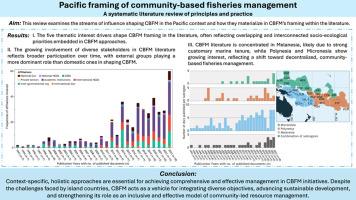太平洋社区渔业管理框架:原则和实践的系统文献综述
IF 5.4
2区 环境科学与生态学
Q1 OCEANOGRAPHY
引用次数: 0
摘要
热带社区渔业在当地的管理方式受到各种社会、经济、环境和政治影响。了解这些因素是什么以及它们如何影响社区的管理干预措施,对于确保更广泛的国家和国际倡议积极促进地方集体行动至关重要。在整个太平洋岛屿区域,社区渔业管理(CBFM)已成为管理沿海渔业资源的一种广泛应用的方法。本综述系统地考察了太平洋沿海渔业文献中CBFM的框架。五个主题利益驱动因素用于指导分析:(i)人权、赋权和包容;(ii)渔业/资源管理;(iii)保存和保护;农村发展;(五)文化和传统知识。本报告探讨了这些框架如何与不同的利益攸关方群体相关联,进而影响在整个区域广泛推广CBFM。它进一步讨论了对实施CBFM关键领域的影响,例如主流利益驱动因素之间的相互作用,以及平衡CBFM中相互竞争的目标和优先事项。虽然太平洋岛屿国家和领土在实施CBFM方面面临着复杂的挑战,但文献将其定义为整合各种目标、支持可持续发展和增强社区福祉的工具。许多文献都强调CBFM将具体情况的整体方法作为有效管理实践的先决条件的重要性。本文章由计算机程序翻译,如有差异,请以英文原文为准。

Pacific framing of community-based fisheries management: A systematic literature review of principles and practice
The way tropical community fisheries are managed locally is shaped by various social, economic, environmental, and political influences. Understanding what these are and how they affect management interventions by communities is critical to ensure broader national and international initiatives positively contribute to enhancing local collective action. Across the Pacific Islands region community-based fisheries management (CBFM) has emerged as a widely applied approach for managing coastal fisheries resources. This review systematically examines how CBFM is framed in Pacific coastal fisheries literature. Five thematic interest drivers are used to guide the analysis: (i) human rights, empowerment, and inclusion; (ii) fisheries/resource management; (iii) conservation and protection; (iv) rural development; and (v) culture and traditional knowledge. The review explores how these framings relate to different stakeholder groups and in turn influence the broader proliferation of CBFM across the region. It further discusses implications for key areas of CBFM implementation, such as the interplay between prevailing interest drivers, and balancing competing objectives and priorities in CBFM. While Pacific Island countries and territories face complex challenges in implementing CBFM, the literature frames it as a vehicle for integrating diverse objectives, supporting sustainable development, and enhancing community well-being. Much of the literature emphasizes the importance CBFM places on context-specific holistic approaches as prerequisite to effective management practices.
求助全文
通过发布文献求助,成功后即可免费获取论文全文。
去求助
来源期刊

Ocean & Coastal Management
环境科学-海洋学
CiteScore
8.50
自引率
15.20%
发文量
321
审稿时长
60 days
期刊介绍:
Ocean & Coastal Management is the leading international journal dedicated to the study of all aspects of ocean and coastal management from the global to local levels.
We publish rigorously peer-reviewed manuscripts from all disciplines, and inter-/trans-disciplinary and co-designed research, but all submissions must make clear the relevance to management and/or governance issues relevant to the sustainable development and conservation of oceans and coasts.
Comparative studies (from sub-national to trans-national cases, and other management / policy arenas) are encouraged, as are studies that critically assess current management practices and governance approaches. Submissions involving robust analysis, development of theory, and improvement of management practice are especially welcome.
 求助内容:
求助内容: 应助结果提醒方式:
应助结果提醒方式:


